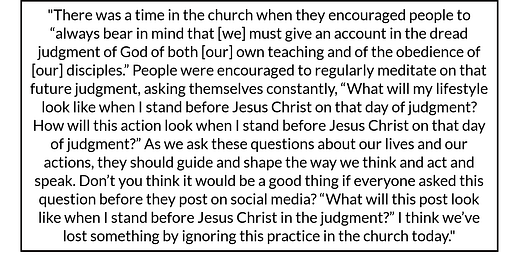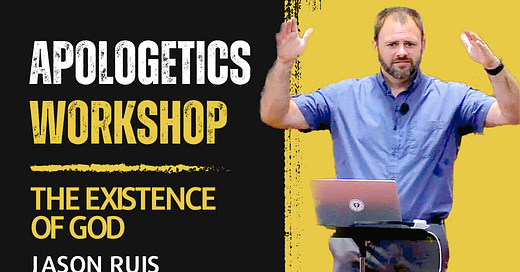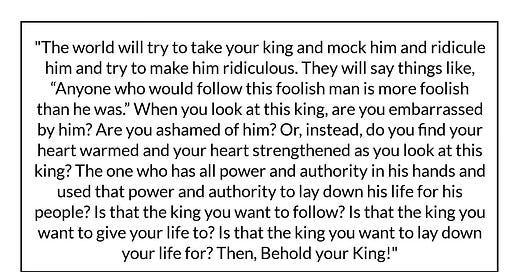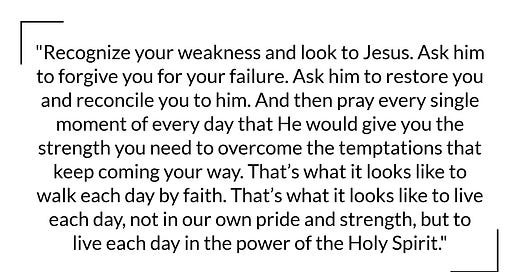
Honor the Son, Honor the Father
[Read John 5:19-30]
There has been a tendency in recent years to attempt a separation between Jesus and other parts of the Bible. This happened right away in the early church. There was a man named Marcion who wanted to throw out the Old Testament. He was teaching that the Old Testament was about an angry and vengeful god but Jesus in the New Testament was all about love. So, we better throw out the Old Testament. People are still attempting to do this today. About a year ago Andy Stanley said that we need to “unhitch ourselves from the Old Testament.” There truly is nothing new under the sun. This has been happening for thousands of years.
I’ve repeatedly run into people who try to separate the words of Jesus from the Old Testament or even the words of the New Testament. When talking to people about gender roles and identity, I often hear people say things like, “Well, Jesus never talked about that.” When talking about issues of homosexuality, I often hear people say things like, “Well, Jesus never talked about that”—which isn’t true by the way. I’ve heard people say that the Apostle Paul was just a bigoted, sexist pig and that we should ignore him.
So, what’s the problem with all of these statements? The answer comes from a passage of the Bible: “All Scripture is breathed out by God…” (2 Timothy 3:16, ESV). That’s pretty clear, isn’t it? All scripture is breathed out by God. It’s all God’s Word. The Old Testament and the New Testament. It’s all from God. The words that came out of Jesus’ mouth and the words that Paul wrote down are all God’s Word. The words that Moses wrote and David wrote and Peter and James and John are all God’s Word. It’s all from God.
And, as we will see in this passage, Jesus doesn’t try to separate himself from God the Father in any way, shape, or form. Jesus will repeatedly say that it’s impossible to separate him from the Father. They are so united that everything Jesus says and does are the same things that the Father is saying and doing. And the opposite is also true, everything that the Father says and does are the things that Jesus is saying and doing. So, in the context of this passage, Jesus is telling the Jewish leaders, “If you have a problem with the things I’m saying and doing, you really have a problem with the Father.”
Now, remember what we’re about to read comes in the context of conflict. Jesus has just healed a man and told him to pick up his mat on the Sabbath—which angered the Jewish leaders. Then, to make things worse, when the Jewish leaders confront Jesus he says, “My Father is working until now, and I am working.” (John 5:17, ESV). So we read, “This was why the Jews were seeking all the more to kill him, because not only was he breaking the Sabbath, but he was even calling God his own Father, making himself equal with God.” (John 5:18, ESV). So, the Jewish leaders were seeking to kill Jesus because he was making himself equal with God.
And here’s Jesus’ response to them. He begins by saying, “Truly, truly, I say to you, the Son can do nothing of his own accord, but only what he sees the Father doing. For whatever the Father does, that the Son does likewise.” (John 5:19, ESV). This is Jesus’ way of saying, “If you have a problem with what I’m saying and doing, you have a problem with the Father because everything I say and do are what the Father is saying and doing.” So, they have a problem with Jesus healing a man and telling him to pick up his mat on the Sabbath, Jesus tells them that he only did what the Father is doing. So, if they have a problem with it, they can take it up with the Father. Jesus is telling them that he is so united to the Father, that he does NOTHING apart from the Father’s will.
And that leads to the second reason for Jesus’ response. Notice the particular wording in verse 18. It said the Jews were seeking to kill Jesus because he was “making himself equal with God.” (John 5:18, ESV). And Jesus’ response is, “I’m not making myself anything. I’m not trying to elevate myself. I’m so united with God that I’m doing the same things he is doing. Not only that, but WHATEVER the Father does, I do it. So, I’m doing everything the Father is doing.” So, Jesus isn’t “making” himself anything. He is equal with God. DA Carson recognizes this and says, “[This] also constitutes another oblique claim to deity; for the only one who could conceivably do whatever the Father does must be as great as the Father, as divine as the Father.” (Carson, 251).
This is also why Jesus says, “Whoever does not honor the Son does not honor the Father who sent him.” (John 5:23, ESV). That’s a strong claim and a solid rebuke for the Jewish leaders. Notice what he’s saying to them. He’s saying, “You THINK you are honoring the Father by having such strict Sabbath rules and by coming after me for supposedly breaking those rules, but you’re not really honoring the Father. You CAN’T honor the Father apart from me. Whoever does not honor ME (Jesus) does not honor the Father who sent him.” That’s some strong correction for the Jewish leaders. By rejecting Jesus—by seeking to kill Jesus—they are dishonoring the Father who sent him—the Father whom they think they are honoring.
This correction cuts both ways and we need to remember today. On the one hand, many people are seeking “God” in various ways and various methods. However, Jesus is teaching that you cannot dishonor him—you cannot ignore him or reject him—and honor God. This is just another way to say that He is the only way to the Father. There is no other way. You cannot get to the Father through any other religion or religious practices—you cannot meditate your way to the Father, you cannot work your way to the Father, you cannot worship your way to the Father. The only way is through Jesus Christ. If you dishonor Jesus Christ by rejecting him or ignoring him or mocking him, it is completely impossible to honor the Father.
On the other hand, many have the opposite problem. They want to honor Jesus but reject the Father. There are people all over the world who love Jesus and think he is great but mock and ignore and are angry with the Father. That’s also impossible. If you dishonor the Father, you are also dishonoring the Son. That’s just the way it is. Because everything the Son is doing is a perfect reflection of the Father. So, if you begin mocking what the Father said and did in the Old Testament or what the Father said through the Apostles in the New Testament, you are mocking the Son too—you are mocking Jesus Christ. There is no separation between them. You can’t have one without the other. You can’t pick and choose. If you want to honor the Father, you have to honor Jesus. If you want to honor Jesus, you have to honor the Father.
Jesus keeps on going and explains some of the things that he does. He says, “For as the Father raises the dead and gives them life, so also the Son gives life to whom he will.” (John 5:21, ESV). He also says, “For as the Father has life in himself, so he has granted the Son also to have life in himself.” (John 5:26, ESV). So, the Father has life in himself—he is life—and therefore the Son also has life in himself—he is life. This is why it makes sense that just as the Father raises the dead and gives life, Jesus will give life to whom he will.
This statement is pointing back to what we’ve just read about in the past two chapters. Most recently, Jesus healed a man who had been an invalid for 38 years. How was he able to do that? He has life and has power to raise the dead, which means he has the power to heal an invalid. Before that Jesus healed an official’s son from twenty miles away. He was able to do that for the same reasons. He has life and has been given authority and power to give that life to whom he wills.
But as we’ve seen in those past two miracles, the life that Jesus gives is more than just physical life. Actually, in the past two miracles, Jesus hasn’t been satisfied with just giving people physical life and healing, has he? No, he’s been more concerned about giving them spiritual life. That’s why Jesus goes on to say, “Truly, truly, I say to you, whoever hears my word and believes him who sent me has eternal life. He does not come into judgment, but has passed from death to life.” (John 5:24, ESV).
This is what Jesus referred to earlier in this passage when he talked about “greater works.” He’s telling the Jewish leaders, “I realize this miracle has you all riled up, but you haven’t seen anything yet. I’m not just here to give people physical healing and physical life. I’m here to bring people eternal life. Life that will extend beyond this life. If this little miracle got you wound up, that’ll really knock your socks off!”
Then Jesus doubles down on this statement by saying “Truly, Truly…” again. He says, “Truly, truly, I say to you, an hour is coming, and is now here, when the dead will hear the voice of the Son of God, and those who hear will live.” (John 5:25, ESV). Again, he’s talking about more than those who are physically dead. He’s talking about those who are also spiritually dead. And he’s telling the Jewish leaders that in the same way that he spoke and healed that invalid, and spoke and healed the official’s son, a day is coming, and is now here—don’t miss that—when he will speak and the dead will come to life, both physically and spiritually.
I want to make sure we don’t miss the part that says, “and is now here” because that’s important. Jesus is saying that this life he brings, this resurrection from the dead he accomplishes, isn’t just a future reality. It’s here now. It happens in this life. Sure, we don’t get to experience it fully in this life, but we get a taste of it in this life. We get a taste of true life coming into our dead bodies and souls in this life. Isn’t that amazing? We don’t have to just sit here and suffer and wait for the final day. That life is here with us now! We can enjoy it. We can experience it. We can love it. We can long for the fullness of it to come on the last day.
Yet, not all will receive this life. Jesus has been clear about that throughout this passage. It’s only “Whoever hears my word and believes him who sent me has eternal life. He does not come into judgment, but has passed from death to life.” (John 5:24, ESV). Those who do not listen to Jesus and do not believe in the one who sent him—or believe in Jesus himself—will not receive life. They will come into judgment. That’s why Jesus also says, “And he has given him authority to execute judgment, because he is the Son of Man. Do not marvel at this, for an hour is coming when all who are in the tombs will hear his voice and come out, those who have done good to the resurrection of life, and those who have done evil to the resurrection of judgment.” (John 5:27–29, ESV). Jesus not only has power and authority to give life and to raise the dead, but he also has power and authority to execute judgment. And he says that an hour is coming when everyone will be raised from the dead—they will hear his voice and come out of the tombs—and they will stand before him in judgment. Those who have done good will be resurrected to life. Those who have done evil will be resurrected to judgment.
Now, these types of statements bother people because it seems contradictory to things we’ve already read—even in this very passage. It seems like this passage is saying that we’re saved based on our works—on things we’ve done—rather than by faith, doesn’t it? Yet, Jesus already told us in this very passage that the only way to be delivered from this judgment was to believe in him—it’s by faith. So, what’s this all about?
Elsewhere, Jesus gives the analogy of a tree and its fruit. He says that a good tree will produce good fruit and a bad tree will produce bad fruit. If you want to determine if a tree is good or bad, look to see if the fruit is good or bad. That’s what’s happening here. If you want to determine if a person is living by faith—a true faith—you look at the fruit of their life. If there is good fruit—according to God’s Word—then it’s telling you that the person has faith. If there is bad fruit—according to God’s Word—then it’s telling you that the person may not have true faith. That’s why we read that people will be judged according to what they have done. They are being judged based on the fruit of their faith or their non-faith. And as I’ve said many, many times, true faith will always change your life—which means it will change your actions, which means you will begin producing good fruit. Not perfect fruit—not perfect all the time—but good fruit nonetheless.
To be honest, I think we need to think about this more often—the final judgment in particular. I hear a lot of people encouraging us to think about our heavenly reward and what it will be like to spend eternity in heaven. That is a good thing that I want to highly encourage. But I hardly ever hear pastors any more encourage people to think about the final judgment. We don’t like to think about the bad things that make us uncomfortable. People worry that it will make us grim and gloomy and possibly crushed and paralyzed. So, since it’s not fun and “encouraging” to think about, we don’t do it. And I think we’re worse because of it.
There was a time in the church when they encouraged people to “always bear in mind that [we] must give an account in the dread judgment of God of both [our] own teaching and of the obedience of [our] disciples.” People were encouraged to regularly meditate on that future judgment, asking themselves constantly, “What will my lifestyle look like when I stand before Jesus Christ on that day of judgment? How will this action look when I stand before Jesus Christ on that day of judgment?” As we ask these questions about our lives and our actions, they should guide and shape the way we think and act and speak. Don’t you think it would be a good thing if everyone asked this question before they post on social media? “What will this post look like when I stand before Jesus Christ in the judgment?” I think we’ve lost something by ignoring this practice in the church today.
Yet, I also don’t think we must only look at the judgment. This passage powerfully tells us that Jesus has power and authority to judge and power and authority to bring life. The judgment is there to cause us to run more fully to Jesus Christ for life—real life—and the life that Jesus gives is about more than just cleansing us and forgiving us and rescuing us from judgment. It does that (and I’m not trying to diminish that in any way. We just read that if we believe in Jesus we will be saved from the judgment) but the life that Jesus brings does more. It raises us from the dead!
That kind of life changes everything. Now that we are truly alive, we have been freed to run down the paths of righteousness. And since we’ve been freed from the judgment, we can run the paths of righteousness without being afraid that we will fail or mess up. We don’t have to worry about every mistake and misstep. We can freely run and live the life God has called us to live, knowing that if we accidentally wander off onto the path, make a mistake, or wind up on the path that leads to death and destruction, we can turn to the one who has power and authority to give us life, we can be cleansed, forgiven, strengthened, and encouraged to get back on the path and keep moving forward—bearing good fruit and bringing honor and glory to the Son and to the Father.









